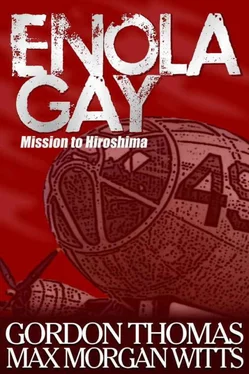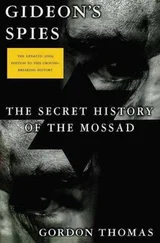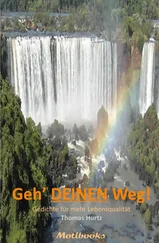Movie houses and theaters were popular. The films and plays were often inferior, but the collective heat generated from several hundred people squashed together was a pleasant experience.
Many people solved the problem of keeping warm by baking flat stones or tiles in their stoves, wrapping them in layers of old newspapers, and placing the bundles next to their skin. As the stones cooled, the newspapers were removed layer by layer. Then, when the heat was finally dissipated, the stones were reheated.
Yokoyama had no doubt: the city was coping. And to anybody challenging him, he would have had a ready answer: Hiroshima was intact.
Yokoyama continued walking toward the castle. From ahead came a loud, concerted shout. Yokoyama broke into a run. Rounding a corner, he saw a house collapse into the street. Instinctively, he looked skyward. There were no airplanes.
Through the dust, he saw a group of youths belonging to the Patriotic Volunteer Corps, boys and girls brought in from the country to work as laborers. The group gathered around the house adjoining the collapsed building. Some of them began to saw through the pillars supporting the house; others attached a stout rope to its ridgepole. One of the boys told Yokoyama they were creating a firebreak in case of air attack.
In many parts of Hiroshima, this demolition work had begun to cut swathes through the city. There had not been such an upheaval since the catastrophic floods of August 6, 1653. On that day in the seventeenth century, hundreds of houses had been ripped from their foundations by nature. Now, enthusiastic youths were achieving what subsequent typhoons had been unable to accomplish.
For Senkichi Awaya, the mayor of Hiroshima, the order to create firebreaks was the hardest he had implemented since taking office in July 1943. If it had been issued by the army, the fifty-one-year-old civil servant would have vigorously challenged the command.
But it had come from the Department of the Interior in Tokyo.
A few days ago, Awaya had telephoned Hiroshima Castle and informed the duty officer of the order. Almost immediately, the regional army headquarters there had issued instructions as to which sections of the city were to be demolished; soldiers would be available to supervise and help with the work.
Throughout the morning of December 6, Mayor Awaya’s frequent meetings were punctuated by the crash of falling buildings. Finally, hardly able to hear himself speak, he had stood at his second-floor office window and gazed down the street at the clouds of dust rising near the Aioi Bridge. He wondered whether the bridge itself, the most striking in Hiroshima, might also eventually be demolished on the army’s orders.
He was reassured by his chief assistant, the diminutive, immaculately dressed Kazumasa Maruyama. Without the bridges, the army’s movements within the city would be drastically curtailed; in an emergency it would be necessary to be able to move troops quickly.
Together the two men watched the destruction. Outside the Town Hall, householders seeking compensation and new accommodations were already forming a line. Maruyama reminded the mayor how limited was the help the city could offer. “We can give them only a few yen.”
“Just three years—now this. And all because of the army.”
For Mayor Awaya to have uttered such words in public would have invited imprisonment, even execution. But in the comfortably furnished mayor’s parlor, he and Maruyama now talked openly about such matters. In the sixteen months they had worked together, each man had revealed himself to the other as a devout pacifist and fierce antimilitarist.
Vastly different in their backgrounds—Awaya was from upper-middle-class stock, while Maruyama was proudly working-class—the men were bound by strong personal ties.
Awaya had acted as go-between for Maruyama during his assistant’s delicate negotiations with his future wife’s parents. As a devout Christian, one of many in Hiroshima, Mayor Awaya had found it difficult to feel his way through the complicated byplay of such discussions, an integral part of Japanese marriage. But the mayor had completed the marriage contract to everyone’s satisfaction.
Awaya wished his wife and the four children still at home in Tokyo could be with him; when he had moved to Hiroshima, they had remained behind so that the children’s education would not be disturbed.
Awaya was one of the most popular mayors the city had known: free from any taint of corruption, easily accessible, and energetic in handling cases of civil injustice. But he knew he was under suspicion because he was a Christian, and that attempts had been made to subvert his staff. Only here, in his office, with Maruyama, could he dare to express himself freely.
This morning, a familiar topic was again raised, what Awaya called the “terrible decline in our city which can be traced to the folly of the militarists in showa fifteen,” a reference to the events of 1941.
In just twenty days’ time, December 28, the Hirohito reign of showa would enter its nineteenth year. Both men agreed that showa was now an ironically inept name. (The word means “enlightened peace.”)
Awaya raised a theme he increasingly brooded over. “We may have to pay dearly for the mistakes that have been made.”
Both men knew how inadequately prepared the city was for an air raid. There were insufficient shelters; the water pressure to the fire hydrants was low; the few evacuation routes out of the city could easily become clogged.
Nor did Awaya feel the fire lanes would provide adequate protection. “Whole areas within the lanes could simply burn themselves out. The lanes can hope only to stop the city being destroyed all at once.”
There was one aspect, however, that Awaya believed they should be grateful for. “The rivers dividing our city provide excellent natural firebreaks. And if necessary, the citizens could take refuge in those rivers from the heat generated by fires.”
Four hundred years old, built on a mound surrounded by a moat, Hiroshima Castle was the centerpiece of a vast military complex. Within its keep were the divisional and regional army headquarters, along with some forty thousand men. The area also contained an infantry training school, a hospital, and ammunition and supply depots. Under the castle was the civilian defense headquarters, the unit responsible for alerting the city to air attack, and the central fire control for the antiaircraft batteries.
The perimeter of this multipurpose installation was adjoined by dozens of small factories producing armaments. The larger factories were located on the banks of the rivers.
Yokoyama’s visits to the castle provided him with visible reaffirmation of the power of the army; there were always rows of fieldpieces and armored vehicles on display. Within the grounds that the army had garrisoned for nearly a hundred years, the mood was optimistic. Officers and men talked only of great victories to come. Nobody drew attention to shell casings made from inferior metals, or the near-empty fuel tanks of the half-tracks and armored cars.
The mood of senior officers at the defense review meeting was buoyant. One followed another to expound a similar theme. Hiroshima, like all other Japanese cities, was ready to meet the enemy. There was loud agreement with the words of the elderly officer who spoke last. “Let the American bombers come—and soon. They will fall from the skies under our guns!”
His eyes swept the room, lighting on the coterie of young antiaircraft officers that included Yokoyama. “The honor will fall to you to strike the first blows. The enemy is arrogant. He believes he can enter our skies with safety, to bomb our women and children. He will be shown otherwise. Do not fail. We will repeat the success of Pearl Harbor.”
Читать дальше












